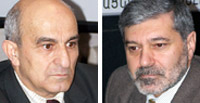International organizations gave very sharp feedback regarding the Nagorno Karabakh constitutional referendum, which took place on December 10, after which followed the sharp criticism of the press secretary of the Armenian president.
This was the topic of discussion during a press conference at the “Hayeli” club with Armenian National Movement (ANM ) administrative staff member, former head of the foreign relations committee of the National Assembly of Armenia Hovhannes Igityan and head of the theoretical philosophy and logistics department of the Yerevan State University Alexander Manasyan.
According to Manasyan, there is no need to lose hope just because some European organizations have responded negatively regarding the approval of the Nagorno Karabakh Constitution.
“It’s not horrible; what’s more, it was mandatory to approve that Constitution based on European approaches. May I recall that based on the decision of the OSCE in 1992, the OSCE considers Armenia, Azerbaijan and the authorities elected by the people of Karabakh as the sides of the conflict,” mentioned Manasyan, adding that that resolution itself obligates the people of NK to have elections because, according to him, the Minsk Group must work with the ones elected based on that resolution.
“With that in mind, the local government and parliamentary elections in Nagorno Karabakh are in accordance with the role of the OSCE, which has promised to work with the authorities elected by the people of Karabakh. To have authorities means to organize the elections, get the authorities, have laws, which is stated in the newly approved Constitution,” said Manasyan.
According to Henrik Igityan, we shouldn’t talk about the Nagorno Karabakh Constitution referendum that much because it’s clear that Karabakh made that decision.
“We have to understand that Karabakh took that step and not Armenia. Armenia has nothing to do with this,” says H. Igityan.
According to him, the text of the NK Constitution corresponds to all the international norms for progress. However, he also believes that Karabakh is not to blame for the negative responses heard after the referendum. Igityan says that Armenia has more guilt because Nagorno Karabakh is not represented and thus doesn’t have a chance to present itself to the organizations that made those negative comments. Arguing that Armenia has never been considered an aggressor by the UN in any resolution, Manasyan mentioned that nearly 10 years after the approval of the UN resolutions, Terry Davis, who is currently the general secretary of the European Council, called Armenia an aggressor country in his speech on Nagorno Karabakh.
“This is where the personal interest approach comes to play. After all, they say that they will work with the ones that are elected. We haven’t made that up. You made us take that role: organize elections and in the end approve a Constitution.”
As for the part about Terry Davis’s speech, H. Igityan said:
“If there was such a resolution (I don’t want to mention any year), claiming that there is a security zone around Nagorno Karabakh, the resolution approved by the European Council changed things around.”
The ANM administrative staff member believes that the Armenian delegation wasn’t supposed to get up and leave the auditorium, but rather it had to stay and see if the statements were changed.
“This is what is more or less written: Armenia has occupied a territory, implemented ethnic-cleansing and stayed there. Now there are some referendums taking place there. You must show that you don’t agree with that approach because that approach doesn’t’ correspond to reality,” mentioned Igityan, adding that raising any resolution approved by the European Council back in 1998 would be enough. According to him, each of the resolutions has a preceding prehistory and it’s stated just how Azerbaijan tried to resolve the conflict by force, how Nagorno Karabakh stood up and was forced to create a security zone, which allowed the people to survive. According to Manasyan, the Armenian delegation could have easily agreed with the following resolution: the sides must liberate all seized territories based on the “legal basis perspective” of the issue.
“Armenia should have used that; not Azerbaijani. Why?-because if you look at it from the legal basis perspective, Azerbaijan has seized territories and not Armenia. Armenia doesn’t have seized territories; the Azerbaijani do,” said Manasyan and explaind that based on that perspective, Nakhijevan is an occupied territory, Central and North Artsakh are occupied territories…
“Those territories are occupied based on the perspective of the political decision of England, but from the perspective of the legal basis Azerbaijan is the occupying side,” he said.
Manasyan doesn’t consider the meetings of Armenian and Azerbaijani Presidents Robert Kocharyan and Ilham Aliev as the Karabakh conflict negotiations because the “resolution approved in 1992 states that the negotiations are trilateral.”
“The negotiations can only be trilateral and have been trilateral,” he said. H. Igityan is of the opinion that it doesn’t matter who considers the presidential meetings as negotiations and who doesn’t.
“The bad thing is that the person leading those negotiations considers them negotiations; in other words, the Minsk Group co-chairmen consider each meeting of the presidents as a negotiation process,” said the former head of the foreign relations committee of the Armenian National Assembly.

